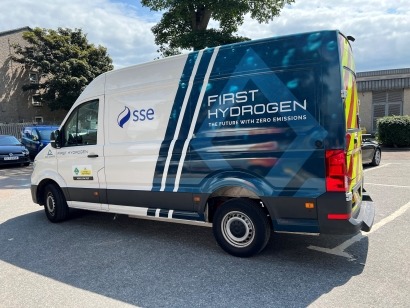
efficiency
During the month-long trial, SSE predominantly drove the First Hydrogen vehicle on major roads in the Aberdeen area. Light traffic conditions in the region enabled the vehicle to run at maximum speed limits, when safe to do so, for longer periods than it had done previously. Even when running at consistently higher speeds the vehicle maintained good fuel efficiency, consuming an average of 1.58kg H 2 /100m, indicating a range capability of over 630km.
As a hybrid, First Hydrogen's vehicle can supplement fuel consumption with battery power when driving includes frequent shifts between acceleration and braking. During most of the journeys undertaken, the van maintained its battery at maximum charge by regenerating from braking i.e., the amount of kWh the battery charged and discharged was comparable, which is testament to the efficiency of First Hydrogen's onboard energy management system.
This data suggests that overall vehicle performance is even better than expected, as it exceeds the results set in pre-trial commissioning tests, especially when driven at constant speed as less braking and accelerating means less fuel is consumed.
Simon Gray, Head of Fleet Services at SSE, says, "SSE is focused on enabling, harnessing and deploying new technologies and innovations which can accelerate the journey to net zero. This trial period in Aberdeen has provided us with real-world insights into the performance of a hydrogen vehicle, a level of understanding that just isn't possible from test data alone. By gaining firsthand knowledge of the van's use in day-to-day scenarios, the feedback from this trial will be invaluable when considering if hydrogen fuel cell electric vehicles could fit into our fleets of the future."
Payload
For several journeys, the hydrogen fuel cell electric vehicle (FCEV) drove fully loaded one way and was part loaded on the return. However, the drivers noted that heavier loads did not noticeably decrease vehicle speed, reduce vehicle range, or affect fuel cell performance.
Downtime and refueling
Due to refurbishment of Aberdeen's hydrogen refueling stations during the trial period, drivers had to refuel First Hydrogen's van at 350 bar rather than the preferred 700 bar pressure fill. Nonetheless, the vehicle continued to successfully execute the longer routes SSE undertook demonstrating it is compatible with existing infrastructure. The team noted that refueling took a matter of minutes when recharging.
Driver experience
The feedback from the drivers was consistently positive. The actual drive experience is very similar to a battery electric vehicle, SSE drivers commented that it is "quiet", "smooth", and "pleasing to drive" with automatic transition. However, drivers found the range capability to be extremely impressive, and remarked that the First Hydrogen vehicle behaves more like a diesel vehicle in terms of range, but without the environment damaging emissions.
Future of zero emissions at SSE
SSE is the first utility business to road test First Hydrogen's first-of-its-kind vehicle. One of the UK's largest energy infrastructure companies, SSE has an established a Net Zero Action Plan and has recently increased investment in renewables and its electricity networks to £18 billion. In 2019 SSE plc committed to transitioning over 3,000 fleet vehicles to electric by 2023, and already it has over 1,100 full EVs in its fleet.
While on trial in Aberdeen, First Hydrogen's van operates as part of a 120-vehicle fleet, 100 of these vehicles are of a similar size and vehicle class to the hydrogen-powered LCV.
Steve Gill, CEO of First Hydrogen Automotive, comments, "Working with such an enthusiastic team at SSE meant we were able to undertake different routes and see the vehicle perform in driving conditions it has not experienced before. We are thrilled with these initial results, which are helping us to build a true picture of the vehicle's capabilities.The trial data shows efficient performance from the fuel cell and suggests that heavier payloads and consistent driving at higher speeds do little to diminish range.”

